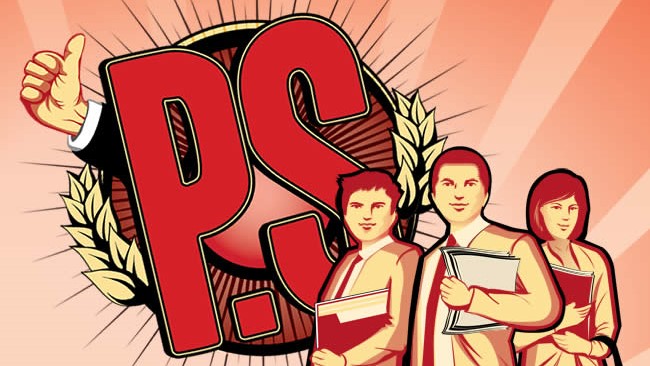Public Service – Are You Really Lovin' It?

Staff Officer Lee Eu Tuin, 67, has a secret that even her husband does not know: For 42 years, she has kept her first pay packet, still sealed, in a box meant for jewellery.
The square envelope, now yellow with age, is a proud souvenir of her first contribution to the Public Service in 1968, at the then Girls Hostel.
Mrs Lee, who works at the Destitute Persons Service (DPS) at the Ministry of Community Development, Youth and Sports, cites “passion” as the key motivating force in her work.
“I want to help people,” she tells Challenge.
After battling ovarian cancer in 2000, Mrs Lee returned to work at the Boys Home. In 2003, she joined DPS, taking on duties that include night foot patrols to pick up vagrants and beggars off the street. She has even had to clean up a vagrant whose clothes were soiled with excreta.

recounts Mrs Lee. “At first I was quite angry but I soon felt very sorry for him to be in such circumstances.”
So driven is Mrs Lee in her work that she has renewed her contract with DPS every year after officially retiring in 2005.
Such dedication is not unheard of in the Public Service. Every year, awards are given out to recognise the contributions of outstanding officers, many with equally moving stories.
The DNA Of A Public Officer
Chairman of the Public Service Commission Eddie Teo believes it is a certain ethos that drives public officers like Mrs Lee to help others.
In his speech “Is the Public Sector Leadership Ethos a Myth or Reality?” at the FIREFLY Leadership Programme in January 2010, Mr Teo said of the ideal public officer: “His incentive is not material but [from] the internal satisfaction of doing good in serving the public.”
The Singapore Public Service ethos, which is largely unwritten, is based on the principles of meritocracy, incorruptibility and impartiality; and the core values of integrity, service and excellence.
“Therefore a good public officer must be someone who has the right ethos and qualities and attributes that make him capable, efficient and effective. He must have his heart in the right place, and care about the people and the country he serves,” says Mr Teo, in an interview with Challenge.
Ms Bernadette Sim, Director of Personnel Policy at the Public Service Division, agrees that the values of integrity, service and excellence need to be in every public officer’s DNA.
“A public officer needs to understand that his role is to serve… and that it requires humility, there is no ‘glamour’, and that most times we have to be prepared for brickbats,” she says.
Mr Kwan Chee Wei, Executive Director of the Human Capital Leadership Institute (HCLI), adds that anyone who wants to thrive in the Public Service needs to think with a long-term horizon. HCLI was set up by the Ministry of Manpower (MOM), in alliance with the Singapore Management University, in February 2010 to raise human capital capabilities in Asia.
“Public-service jobs are different from private-sector jobs because typically you don’t see tangible results in the short term, perhaps with the exception of teachers,” says Mr Kwan, who has more than 20 years of Human Resource experience in both sectors, including the Defence Ministry. He gives the example of policy planning, which could take months or years of effort before any tangible results become apparent.
10 Things You Should Read Before Joining the Public Service
Whether you’re a fresh graduate or planning a mid-career switch, Challenge is your go-to for a fresh take on the Singapore Public Service.
- Prepare yourself for a career in the Public Service
- Be inspired by the personal philosophies of senior Public Service leaders
- Get to know the funny side of the Public Service

Download this specially curated edition of Challenge now!
Fill in the form below to download
What Spurs Passion?
Apart from intrinsic factors such as one’s DNA, there are also three external key drivers of engagement that the Civil Service College (CSC) has identified over the years: leadership and culture, career advancement, and job motivation and growth.
The findings are based on the five-year results of the college’s Public Service Employee Engagement Survey (EES), which helps public agencies gain deeper understanding of their organisational culture and employee-related issues.
“An officer who feels that he is not learning new things and developing professionally, and is not confident about achieving his career goals, is less likely to stay on in an organisation in the longer term,” says Mr Low Chee Seng, Director of CSC’s Centre for Organisation Development, which developed the EES.
According to HCLI’s Mr Kwan, there are some basic questions that all employees, whether in the public or private sector, ask themselves periodically.
They are: What am I doing here? Do I have enough resources to do my work? Does my boss tell me what is going on? Does he respect me? If I do well, do I know how I will be rewarded? Am l learning on the job? Do I have a career?
“This might seem oversimplifying it, but if a supervisor can answer all these questions and communicate to the person all these things, and give a sense of career advancement, then I think you will have a more engaged employee,” he says.
The Role Of Leaders
“We need strong and enlightened leaders who can inspire people working under them to do better, leaders who give people the space to experiment and explore, leaders who have the confidence and sound judgment to know when and how to take a chance with untested ideas,” said Mr Peter Ho, Head of Civil Service, in his 2007 speech “PS21 – Empowerment, Experimentation and Enlightened Leadership”.
And leadership, he stressed, is not limited to Permanent Secretaries and Chief Executive Officers. “Change and improvement cannot happen without strong leadership at every level. We will need everyone who is a supervisor…to play their roles as leaders to empower their people,” he said.
Mr Leo Yip, Chairman of the Economic Development Board (EDB), agrees that leaders have a crucial role in spurring passion and pride.
“In the Public Service, we all serve a higher purpose, one that is above and beyond the individual and the organisation,” he tells Challenge. “This is something leadership must communicate and emphasise regularly. I do this at town hall meetings and in regular communication with staff. It must also be something that leadership should live and exemplify.”
He adds: “Celebrating successes, recognising organisational and individual accomplishments and their impact on Singaporeans are [also] important. Leadership must feel proud about what their staff are doing, and convey this.”
Mr Kwan points out that “the work itself could be really boring; you can’t change that but you (the leader) could change the environment. There’s nothing to stop you from engaging your people and organising social activities to bring them together, because the work environment plays a big part as to why people like to come to work”.

What Stifles Passion?
Ms Ng Hwee Koon, 33, who spent seven years in the Public Service, says she knows of many whose passion was “killed” owing to a punishing work culture.
“The Ministry [I worked for] can be a harsh task master and sometimes, I think it takes pride in that. If you don’t thrive, it must be because you’re weak. If your boss is unreasonable, it must be because you aren’t good at managing him. There’s no use complaining because that reinforces the impression that you can’t handle it. It can be very unforgiving that way,” she says.
Internal climate surveys such as the EES throw light on such issues, says Mr Low. The survey, which is conducted every two years, gets all staff to complete a questionnaire designed to measure engagement and drivers of engagement. Agencies would then implement interventions to close the gaps identified by the survey.
“At MOM, for instance, all their heads of departments take ownership and… work out action plans to deal with areas of concern highlighted in their climate survey and the ministry has consistently demonstrated improved engagement scores over time,” he explains.
A strong sense of empowerment is certainly a reason why Mr Umeer Hyder Abdul Rahman, 29, is so driven at work.
“Although I am not a senior officer, the management has given the support by allowing me to approach certain higher channels directly for my work. So I don’t feel burdened by hierarchy,” says the team supervisor of MOM’s Customer Responsiveness Department’s counter operations.
Although he has been in the Service for less than four years, Mr Umeer has already earned the reputation of being able to handle the most challenging customers. This included counselling a suicidal foreign worker.
His sincerity prompted a member of the public to e-mail MOM, saying:


Younger Breed
While Mr Umeer is clear that his future is with the Service, other young officers may not feel quite the same way.
Observes a former public officer, 37, now in marketing: “You see a younger generation of questioners but… these people also get frustrated with the system… Hence you see many leaving the Service after a while.”
Challenge asks a former Management Associate (MA) why he left after six months.

Realising that he was more businessminded than “policy-minded”, he quit after six months, and sold his car to fund his own start-up.
“Unless you’re at the top, the decisions you make are very small on an everyday basis,” he says. “But now that I am out on my own, every decision I make will mean something.”
The former MA falls under the growing Generation Y workforce (born in the 80s) that Mr Kwan describes as having “little patience”.
Ms Sim from PSD agrees: “We have found from our fresh graduate surveys that ‘development’ is key for the younger generation. They would consider that after one year that they’ve been ‘developed’ and have had ‘experience’ and can move on. But I think many current leaders in private and public sectors feel that it does take time to develop real experience and wisdom.”
Leaders, she adds, will therefore have to help younger staff manage their expectations, and understand the importance of gaining wisdom, not just experience, as it helps them to make better decisions on the job.
There is also a trend that Gen Y employees like to be engaged as friends and have more face-to-face communication with their supervisors, and prefer more autonomy in decision making.
“They also seem to be able to work late into the night but are not early risers,” says Ms Sim, adding that more flexible working arrangements, such as telecommuting would resonate with these officers.
Additionally, organisations, in private and public sectors, have responded to the needs of the younger workforce by conducting regular feedback and developmental planning sessions for officers, drawing up individual personal development plans, and implementing job rotations.
More managers are also being groomed to become better communicators and mentors so that they can engage their staff better.
Fostering Trust
One way of engaging staff (young or old) is to foster a culture of trust that would encourage them to express their opinions and frustrations more openly.
In his speech, Mr Teo highlighted the case of an MA who was the only one who spoke up against a decision taken by her Ministry. The other more senior officers in the room agreed with her but kept silent.
“What was implied was that as you become more senior, you learn to keep quiet and not contradict decisions you disagree with,” said Mr Teo in his speech. “I find this rather sad and I hope that the episode was an aberration rather than the prevailing mindset of our senior public sector leaders.”
He added: “I hope the young officer will not shut up the next time she disagrees. The one redeeming feature of the episode was that the Permanent Secretary saw the officer’s action as something positive. So there is still hope.”
While Mr Teo’s point was to highlight the need for officers to “speak the truth to power”, the example underscores the fear (real or imagined) that some staff have in openly expressing their opinions and frustrations.
“It depends on your supervisor,” says a Senior ICA Officer in his 30s. “Most of the time it doesn’t work if you’re stuck with a supervisor who is not approachable.”
“[Trust] has to be built over time and how you react to the feedback . If staff feel threatened they will not give feedback,” says Mrs Dolly Ong, Principal of ZhongHua Secondary School, adding that there must also be adequate follow up action; otherwise staff will not want to give feedback again.
A 33-year-old officer from the Ministry of Information, Communications and the Arts tells Challenge that she has been encouraged by the culture of openness at her workplace. “My Permanent Secretary told me his door was open right from the start. I’ve disagreed with my boss without fear. In fact, I think he appreciates it,” she says.
But if you fear you might over-step the fine line between courage and career suicide, Mr Teo had this advice: Choose the manner and occasion you speak, for example by bringing up your views to supervisors in a more discreet manner.
Clichéd as it sounds, it does take two hands to clap. So while leaders need to work harder to reach out to their staff, employees will also have to rise to the challenge to create change at the workplace.
Mr Teo argued that the confusion between myth and reality arises due to the perception of what ethos is. For him, the Public Service ethos is really a benchmark against which public officers should strive to measure themselves, rather than a description of what actually exists.
In his speech, Mr Teo gave his interpretation of the different segments of ethos, based on the Singapore Public Service’s principles of Meritocracy, Incorruptibility, and Impartiality and values of Integrity, Service and Excellence. He explained their impact on public officers and discussed the tensions faced by ethos in recent times due to changes in the demands on public service. Here are excerpts from his speech.

On Leadership
Leaders and managers often fail to realise how important a role they play in passing values down to their staff. Your officers not only listen carefully to what you say but also watch closely what you do, and very often they take the cue from you. And because there are good and bad leaders, leaders can be a good or bad influence.
On Meritocracy
Dr Kenneth Paul Tan (of the Lee Kuan Yew School of Public Policy) argues that a system of meritocracy as practised in Singapore is unequal because the “winners” define “merit” and this in turn breeds elitism. He thinks that the idea of meritocracy is unsustainable for the long term because the elite class will become “increasingly narrow, exclusive, and dismissive towards others” and as public sector careers become more lucrative, public officers and politicians will become preoccupied with staying in power mainly for the money. He concludes that our meritocratic system is starting to show signs of becoming a victim of its own success.
[This is] useful as a warning of what could go wrong in Singapore. However, because we are already aware of the risks, we can do something to prevent ourselves from going down the path he thinks we will go. And subscribing to a Public Sector Leadership Ethos is one way of ensuring this.
On Political Neutrality
In Singapore, where the same political party has been in power for 45 years, can and should the Public Service be “politically neutral”? After such a lengthy cohabitation, is the Singapore Public Service totally politicised and just an administrative arm of the People’s Action Party, as alleged by some critics?
A former senior civil servant, J.Y.M Pillay, has argued that the Public Service should be impartial but not politically neutral because it must be pro-Government, in that it should serve the government in power. I think this argument is valid only if we make no distinction whatsoever between the government and the ruling political party and between national and party interest.
Even though the longevity of the PAP has made the distinction blurred, so long as public officers believe that the public interest does not always coincide with the party interest, the term “political neutrality” continues to be a useful reminder of their proper role.
On Moral Dilemmas
The idealism of some young officers sometimes cause them not to see reality in hues of grey but almost always in stark black and white. The hardest moral dilemmas are not those between right and wrong but between right and right and the most difficult policy decision is sometimes that between a bad option and a worse option because there are no good options. And even the brightest of our scholar public servants will have blind spots and may fail to see the bigger picture.
These are occasions which call for public sector leaders with good mentoring skills to help guide the young officer through the complexities of the policy issue so that he can see that while there may have been some compromise with the Public Service ethos, the overall outcome can still be in the public interest. But if the officer is still not convinced and feels very strongly about the matter, the most honourable recourse for him is to resign. It will be a painful and difficult decision, and may cause material hardship, but living with one’s principles can never be easy, painless and without sacrifice.
On Altruism
Our Public Sector Leaders are not prepared to accept that altruism no longer counts in the Public Service. They continue to believe that Public Service is a calling and not just another job.
Salaries are never touted as a selling point because we realise that if we do so, we are signalling to those seeking public service jobs that just as their loyalty can be bought, it can also be sold.
Conclusion
A Public Sector Leadership ethos continues to be relevant and important. Even in a pragmatic society like Singapore, we cannot ignore the need for strong values and principles in life as well as at work.
It would be a great shame if the altruistic aspect of Public Service is eroded and we stop regarding Public Service as a vocation. Removing the Public Service ethos will pluck the soul out of the Public Service and remove the true meaning and purpose of working for government.
Their greatest satisfaction comes from…
- “My pupils – that explains why I am still in the Service.”
33-year-old primary school teacher - “From knowing that whatever you do will probably have a national impact.”
37-year-old Senior Officer, Immigrations & Checkpoints Authority of Singapore - “That I am contributing to the safety of Singapore.”
37-year-old Marketing Manager who was in Public Service for 10 years
Editor’s Note: Why did you join the Public Service? What keeps you in the Service? Share your thoughts so we can explore in greater depth this complex matter of Public Service and its ethos. Write to us at: psd_challenge@psd.gov.sg
This article was first published in the May/June 2010 issue of Challenge on 4 May 2010 and updated on 18 Sep 2018.
- POSTED ON
Sep 18, 2018
-
Deep Dive
Strengthening Singapore’s Food Security









